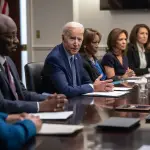In today’s tumultuous world, bold moves on the international stage can drastically change the game. Recently, South Carolina Senator Lindsey Graham stepped into the spotlight to shine a light on foreign affairs, particularly regarding Ukraine, Iran, and the overall stance of the current administration. With a firm voice and a few zingers up his sleeve, he presented a case for the urgent need to reassess America’s foreign policy, especially as threats loom like storm clouds on the horizon.
The senator began by voicing concerns about the Biden administration’s handling of the war in Ukraine. He pointed out that the president recently met with the new UK Prime Minister, but appeared to be hesitant to fully support Ukraine in its fight against Russian aggression. Graham asserted that Putin’s threats should not dictate U.S. policy, arguing that hesitancy to deploy military aid is emboldening Russia. He expressed that it’s critical for NATO allies to fortify Ukraine’s position, aiming for a resolution that supports Ukrainian sovereignty without giving in to Putin’s demands. In Graham’s view, the current approach of slow weapon deliveries and lack of strategic pressure on Russia is a recipe for disaster.
Turning to the Middle East, the senator cast a wary eye on Iran. He recounted how the previous administration had effectively kept Iran in check, only to see those hard-fought gains slip away once Biden took office. With Iran ramping up oil production and gearing up towards possible nuclear capabilities, Graham warned that America is facing a grave threat. He reminisced about the days when Trump’s administration kept Iran “in a box,” and suggested that a return to strong measures is essential to prevent a nuclear catastrophe. The senator implied that if Iran were to acquire a nuclear weapon, it would not hesitate to use it, especially under the current leadership of the Ayatollah, whom Graham compared unfavorably to a “religious Nazi.”
But Graham didn’t stop there; he painted a picture of a world on fire, not just due to conflicts but because of the perceived weakness in U.S. leadership. He expressed fears of a new 9/11 catastrophe brewing from lax security measures and a broken immigration system, suggesting that terrorists could exploit these flaws. His call for stronger border security and a more rational immigration policy is not just about protecting the U.S. territorial borders, but also about safeguarding the nation against potential threats lurking within.
As the conversation shifted back to Ukraine, Graham emphasized the need for decisive leadership. He was adamant that any resolution to the ongoing conflict must ensure that Ukraine retains its territory and sovereignty. Giving in to Putin would be tantamount to resigning to future aggression, particularly with China’s gaze fixed on Taiwan. The senator urged for a strategy that not only addresses the immediate crisis but also discourages further invasions by sending a clear message: America will not stand idle while tyrants march forward.
Finally, Graham didn’t shy away from discussing domestic matters either. He critiqued the current energy policies, advocating for the U.S. to take a more active role in supplying Europe with natural gas, countering Russian influence while simultaneously bolstering American jobs. In an audacious final flourish, he suggested President Trump would lead with strength and resolve, bringing about a much-needed shift in direction for the country and the world.
In a time of uncertainty, Senator Graham’s passionate critique of the current administration stirs up a spirited debate about America’s foreign policy and its implications for national security. As the clock ticks down to the next election cycle, it seems one thing is clear: the stakes have never been higher, and the world is indeed watching. The call for a stronger, more assertive America resonates now more than ever.




